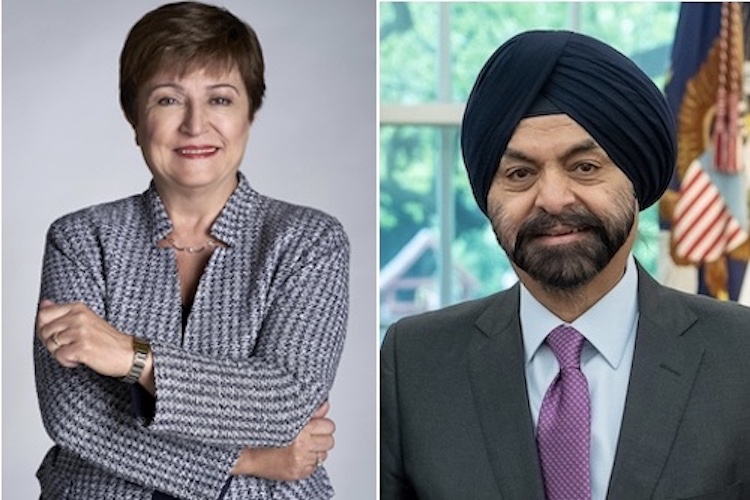By Kristalina Georgieva and Ajay Banga
Following are excerpts from the Joint Statement issued by Kristalina Georgieva, Managing Director of the International Monetary Fund (IMF), and Ajay Banga, President of the World Bank, on 7 September 2023.
WASHINGTON, DC. 8 September 2023 (IDN) — The world confronts significant economic challenges, the existential threat of climate change as well as a digital transition, all in the context of more frequent shocks, high debt levels, limited policy space in many countries and rising geopolitical tensions.
Well-designed and appropriately sequenced policies are critical to help accelerate growth, alleviate policy trade-offs, and support the green and digital transitions. The Bretton Woods institutions have a critical role to play to help member countries address the challenges and leverage the opportunities, working closely together and with partners.
The world is facing geoeconomic fragmentation, extreme natural disasters exacerbated by climate change, and increasing levels of public debt. Rapid digitalization and technological transformations create new challenges, but also opportunities. With well-designed and appropriately sequenced reforms, the digital and green transitions can bring tremendous economic, social and environmental gains, and add to welfare and prosperity.
The Bretton Woods institutions, with their universal membership and specialist expertise, are well placed to make a critical contribution to help countries tackle these challenges. The challenges are too great for individual actors to address. International financial institutions, national governments, philanthropic foundations, as well as the private sector, must work together.
The Fund and the Bank, working jointly, can play a key catalytic role in this broader collective effort, as they have done in the past. The Bretton Woods institutions were established in 1944 to help rebuild a world economy devastated by global depression and war. As the world economy has changed over the past 80 years, the Bank and the Fund have continued to adapt and worked closely together to serve their members’ needs.
We are committed to enhancing our collaboration to deliver tangible benefits for people, businesses, and institutions of our member countries.
We will do so by drawing on our respective mandates and expertise—the World Bank’s diverse skills and experience, including on sustainable growth and structural transformation and its significant footprint in client countries; the Fund with its capabilities to support macroeconomic and financial stability, and promote economic conditions conducive to growth and sustainability. We will coordinate closely our global, regional, and country level engagements to ensure that our resources are deployed efficiently and effectively, driven by a focus on results for our members.
We will do so by building on our long history of joint action and collaboration frameworks. Past efforts have resulted in strengthened coordination of policy advice to countries and the establishment of joint programs and initiatives. Examples include our joint assessments of financial sector soundness in emerging markets and developing economies and of debt sustainability in low-income countries; and broader collaboration frameworks, such as the 1989 Concordat and the 2007 Joint Management Action Plan.

Today, we need to enhance further our collaboration, in particular with regards to climate change, renewed high debt vulnerabilities, and digital transition.
Climate change
Climate change is a threat to global peace, security, economic stability, and development. To address this challenge, our institutions need to help all our member countries integrate their climate and development goals. Given the critical nature of this work stream, we will put Bank-Fund collaboration in this area on a more structured and institutionalized footing.
· The Bank and the Fund will promote complementarity and synergies in their climate-related works. The updated core mandate of the World Bank puts climate explicitly as one of the core areas of the Bank’s efforts and builds on an ongoing multiyear engagement on climate action and development. Building on its Climate Change Action Plan, the Country Climate and Development Reports (CCDRs), and extensive country-level policy work, the World Bank provides policy advice on climate issues to member countries, supports policy reforms through Development Policy Financing and provides financing for specific investments at the sectoral level through investment and program for results loans.
The Fund has adopted a new climate strategy that includes coverage of macro-critical climate issues as part of Article IV consultations and expanded technical assistance in areas where it has specialized expertise. It has also established the Resilience and Sustainability Trust (RST) to provide affordable long-term finance to vulnerable countries implementing macro-critical climate reforms. The two institutions are successfully co-hosting the Secretariat of the Coalition of Finance Ministers for Climate Action.
· The two institutions will further strengthen coordination and focus on results. We will formalize the regular meetings of the new Bank-Fund Climate Advisory Group, tasked with ensuring coordination of our climate related work streams. The group will meet every two months to discuss global and country level engagements, including the results of CCDRs, country level climate analytical work, and the pipeline of key projects and policy-based lending (World Bank’s DPLs and Fund’s RST engagements). We will also incorporate climate considerations in our ongoing work on debt sustainability, including through the revised joint Low Income Country Debt Sustainability Framework.
Debt vulnerabilities
The Bank and the Fund have long worked closely together on debt challenges, both in operational work in individual countries and at the global level. The current context of elevated debt vulnerabilities gives renewed urgency to intensified collaboration, building and leveraging on our respective areas of expertise. We will enhance our joint work to help prevent further build-up of debt vulnerabilities, assisting countries to strengthen debt management and transparency and public finances, while improving the joint Low Income Country Debt Sustainability Framework to better account for current challenges. We will also deepen our support to creditors and debtors engaged in a debt restructuring and will work further with our partners to improve restructuring processes, including under the Common Framework, building on the work we launched at the Global Sovereign Debt Roundtable.
Digital transition
The ongoing digital transition is at the forefront of development and provides a unique opportunity for countries to accelerate economic growth and connect citizens to services and jobs. Yet in 2022, nearly 3 billion people remained offline, the vast majority of whom live in developing countries, and the wide gaps in usage of digital products between and within countries remain a challenge. The Bank works with governments in emerging and developing countries to address regulatory and infrastructure constraints to digital inclusion and transformation, and to promote financial inclusion and low-cost payments systems, expand digitalization of government services and operations. The Fund focuses on supporting digital transformation in the financial sector to promote wider use of new financial technologies while maintaining the integrity and stability of the financial system.
We will step up our joint work to help countries increase the effectiveness of revenue collection and expenditure systems in governments and reap the benefit of new digital technologies while mitigating the risks, including on ways to improve cross-border payments, support implementation of the G20 Roadmap to enhance cross-border payments, and ensure that payment innovations spur growth, poverty reduction and job creation.
The Bank and the Fund will work with shareholders and partners to mobilize the substantial resources needed to meet the complex challenges the world faces today. This requires both domestic and external resources. To this end, we will increase our support to help countries build strong tax policy and administration and fiscal institutions that deliver efficient public spending and sound debt and public financial management, along with our ongoing work to support development of strong domestic financial markets.
The world can, and must, come together to address global challenges. The IMF and World Bank are committed to help advance this common effort.[IDN-InDepthNews]
Source: Eurasia Review
Image source: Eurasia Review
IDN is the flagship agency of the Non-profit International Press Syndicate.


